It’s just gone 9pm at Sydney’s Enmore Theatre, and Gang of Youths frontman David Le’aupepe is poised at the front of the stage, slamming his fist into his chest.
His brown boots rock back forth on the edge of the stage as the crescendo of ‘Fear and Trembling’ builds behind him — each fist slam punctuated by an anguished yell: “I feel everything.” Slam. “Yeah I feel it all.” Slam. “And I feel it in my bones and in my fucking skull.” Slam.
The crowd begins to copy him; heartbeats matching heartbeats. Le’aupepe twists and runs across the stage, pushing his wavy hair back from his forehead as the theatre plunges into darkness. Moments later, the clanging notes of ‘What Can I Do If The Fire Goes Out’ ring out, and Le’aupepe is twirling, clutching his white Gretsch guitar. He nods to his bandmates — bassist Max Dunn, pianist Jung Kim, guitarist Joji Malani, and drummer Donnie Borzestowski — and in the blink of an eye they’re careening off again.
If the band’s touring schedule had gone as planned, then tonight’s Enmore show wouldn’t actually be happening. The band were forced to cancel their November 21 date (the first of six at the theatre) at the last minute due to Le’aupepe battling a chest infection, so that show was moved to the very end of January. It’s their last Australian headline tour date they’ll perform for their ARIA-Award winning album Go Farther in Lightness, which has already taken them around the country, as well as Europe and North America.
It’s been physically and emotionally gruelling, but tonight there’s no shadow of exhaustion. It’s frenetic, it’s overwhelming — it’s just Gang of Youths, really.
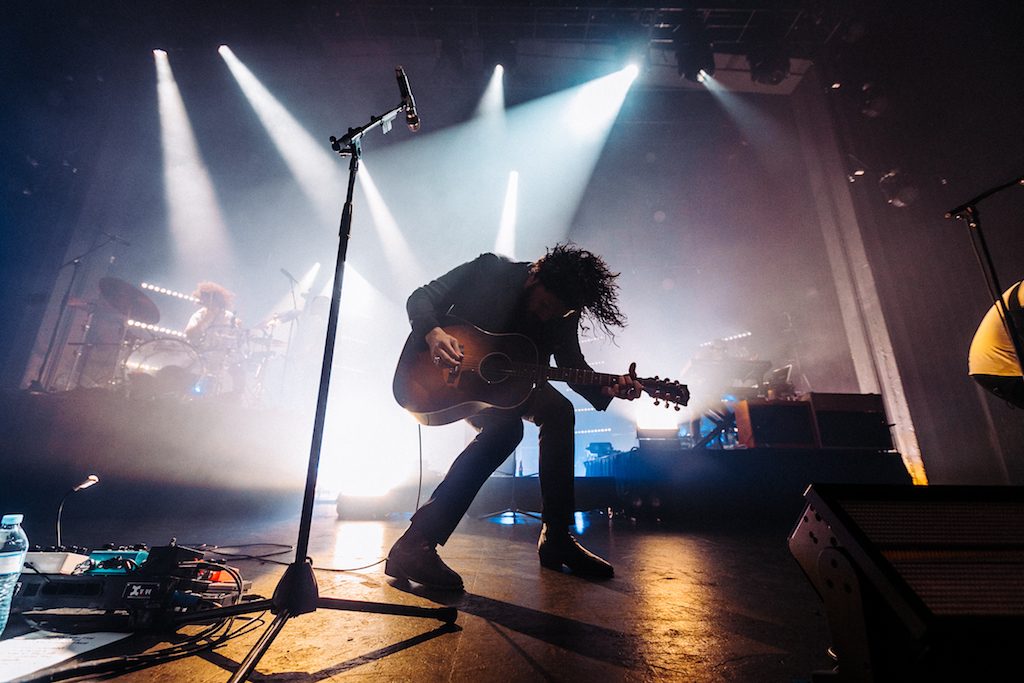
The Deepest Sighs
A few days before the Enmore show, Le’aupepe is walking through Wellington, New Zealand, trying to find somewhere quiet to talk. After a couple of blasts of crackling reception and a few shouts of “Oh shit, can you hear me?”, he finally finds a spot on a park bench with decent signal.
To speak to Le’aupepe is to engage in Olympic level talking: ferociously passionate and intelligent, the conversation swerves from the role of masculinity in performance, to his ongoing relationship with religion, to the emancipatory potential of the gospels, and the redemptive power of music and love. Most profiles pin him as a dark, brooding presence, a rock star caricature consumed by his own thoughts. And there is a kernel of truth to that — at times it feels like he’s searching for an answer within the sentence as he speaks it, uncertain whether he’ll find the outcome he’s looking for.
There’s also plenty of material in Gang of Youths’ backstory that lends itself to the tortured artist stereotype. The band’s origin story is well known: in the midst of his marriage breakdown and his then-wife’s struggle with cancer, Le’aupepe began writing and recording songs as a way to give light to an increasingly dark situation; struggles with addiction and a 2014 suicide attempt (chronicled in the song ‘Magnolia’) followed. Acclaimed 2015 debut The Positions captured it all with brutal and confronting honesty.
If The Positions was him sending us dispatches from the darkest of tunnels, then follow-up Go Farther In Lightness was him running full tilt towards the light at the tunnel’s end, determined to find a way back. The world might be fucked up and dark, he imparts on songs like ‘The Heart Is A Muscle’ and ‘Fear And Trembling’, but we all need to keep going. The album skyrocketed the band to even greater acclaim and fame — winning four ARIA Awards (including the big one, Album of the Year) and clinching multiple spots in triple j’s Hottest 100. Headlining festival slots around the world followed.
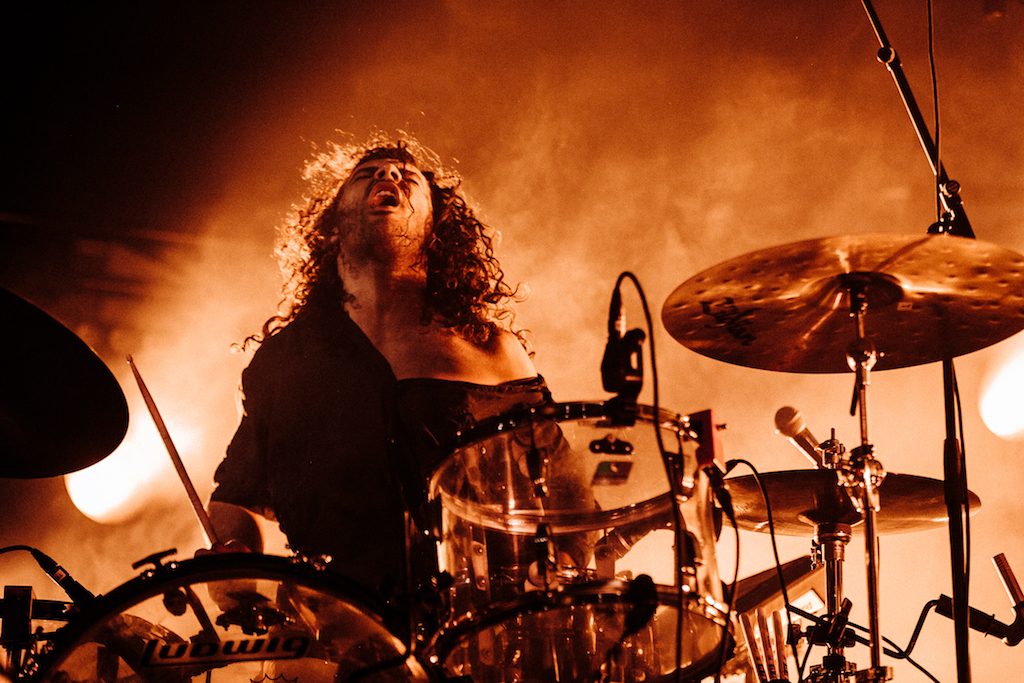
There’s been a lot of heaviness, but there’s also plenty of levity too. Le’aupepe is quick to laugh and crack a joke — at one point in our conversation he gets distracted by the amusing spectacle of a seagull stealing a woman’s food — and is self-deprecating to a fault. Throughout our chat he’ll repeatedly refer to himself as a “fuck up” — he also quickly shrugs off the suggestion that Gang of Youths are the biggest band in Australia at the moment.
“I gotta be honest, I don’t love labels like that,” he says, after a moment of pause. “I think it belongs in an era where when we talked about music, it was predicated entirely on salaciousness and hype and I’d really love to not be part of that. I don’t read anything that comes out about us, and I don’t like reading my own interviews because my own fucking sense of peace in the world is just terrible and it’s just a terrible idea.”
“We’d rather not be the biggest, if that makes sense,” he continues. “We would like to be the best. We would like to. I don’t know if we will ever get there, but we would like to be. It’s never been like an ambition to be the biggest band in anything — being the biggest isn’t necessarily the point.”
He feels similarly about pointy accolades like ARIA Awards (of which the band have quite a few now, courtesy of Go Farther In Lightness), but he also acknowledges their importance.
“We wanted to give the people who had been seeing us since the beginning one last little go at something tangible and intimate.”
“The only thing that a remotely significant part of it for me is my dad got to see me on tele say his name,” he says. “Culturally to me, being Samoan, that was the one thing I wanted to indulge — being a Polynesian boy playing rock music and reaching the heights alongside Joji, who’s Melanesian. It felt really significant. Hell, the very fact that we made it out of Sydney is a fucking miracle.”
What Le’aupepe and the band do care about is their audience, and maintaining the intense emotional connection they have with their fans. Key to Le’aupepe’s discomfort with the trappings of fame is that his fans would feel disconnected from him, that they may be reluctant to come up and speak to him and hug him and share their experiences. For him and the band, tearing down that fourth wall between them and the audience (“Bullshit fucking fake market-driven mystery,” he spits) is what it’s all about.
It’s also why they chose to play multiple shows in smaller theatres on the Say Yes To Life tour, instead of leap-frogging to bigger arenas (which they easily could have done.)
“Who the fuck wants to see a band like us in a big arena when you can see it in a small one?” He says. “It feels like a really fucking ingratiating and self aggrandising thing, to go straight to a big arena with your second album. We wanted to give the people who had been seeing us since the beginning one last little go at something tangible and intimate.”
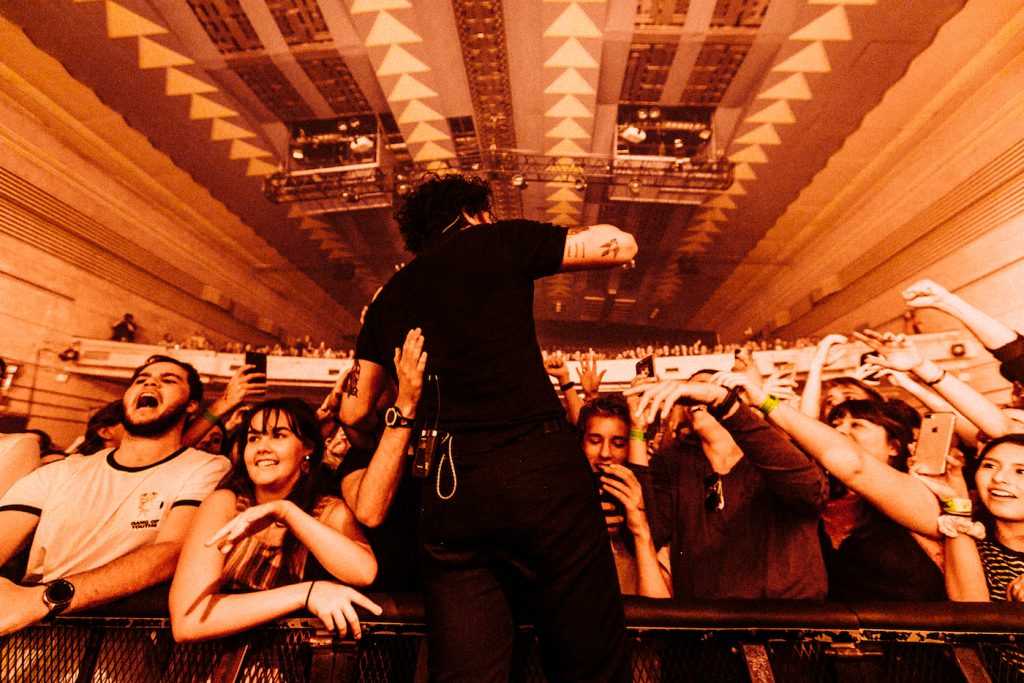
Performance And Godliness
If you were to ask a Gang of Youths fan about the band’s live performances, there’s a good chance the phrase “religious experience” would crop up at some point. It’s hardly unusual for devotees of a band to use this phrase — but what is slightly unusual is that it’s more or less on the money for Gang of Youths.
Le’aupepe’s relationship to religion is, somewhat predictably, complicated. Born to a Jewish mother and raised in the Pentecostal megachurch Hillsong (where he met some some of his bandmates) his connection to God and spirituality is constantly changing, constantly questioned, and it’s this collision of belief that lends a transcendental edge to their music.
“There isn’t a day that goes by that I don’t ponder something to do with my evangelical heritage,” he admits. “Or the fact that I grew up in a weird Jewish/Christian hybrid — that being the Messianic Jewish community, because I’m Jewish by birth and by blood. These kind of quandaries inform everything about my life.
“It’s weird how like we talk about religion being the opioid of the masses…I don’t necessarily agree with that. I saw Nick Cave the other night speaking about how the importance of belief… how he believes in belief, even though he may not believe in the God all the time. And I think that’s a really profound gesture and understanding of something that’s so intrinsically motivating and compelling to the human condition. It’s something that will inform everything.”
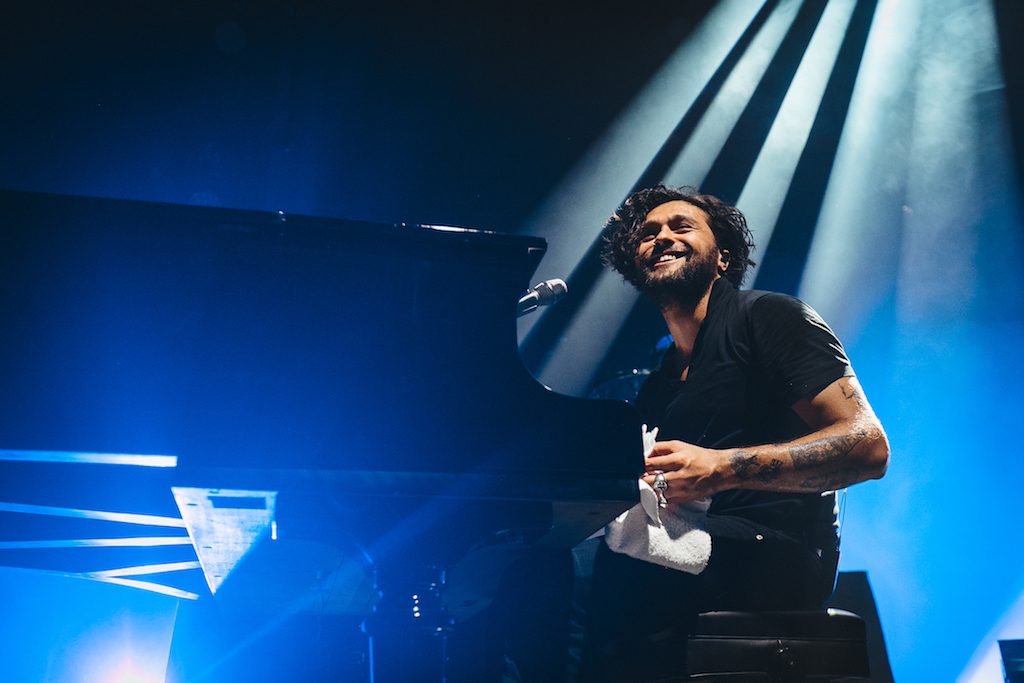
Le’aupepe does consider himself religious — but as always, there are caveats to his belief. “I think people would be surprised to know that I have a pretty conventional relationship with the gospel,” he says. “In terms of the way I approach the central tenets of Christianity. But when it comes to shit like hell…I don’t really believe in hell necessarily. But maybe there’s something about that doctrine…The idea that maybe God is redeeming…and atoning sacrifice through Jesus Christ is enough to fucking save everybody.”
“What does bother me about the church is the colonial imprint of it,” he continues. “The oppressive imprint of it. The fact that compelling stories of love between people of the same gender or the same sex, and things that are demonstrative of real beautiful, biblical Christian love, have been rejected by the church as fucking heresy or evil. I hate that.”
If you strip all the bullshit away, he says, the central tenets of the gospel — to love God, love thy neighbour, fight for the oppressed and help the poor — exist within him still.
He doesn’t know whether he calls himself a Christian, or Jewish, or a Christian humanist, or, heck, a “fucking Messianic Jewish humanist.” The categorisation is secondary — what does matter, and what continues to draw him in, is the potential of religion to help people, to free people. If you strip all the bullshit away, he says, the central tenets of the gospel — to love God, love thy neighbour, fight for the oppressed and help the poor — exist within him still. Similarly, music isn’t a selfish pursuit: it’s a way to help people.
“I think the thing that still brings me toward some sense of conventional belief in the religion of my upbringing is the emancipatory potential of the gospel,” he says. “Its ability to free people from shit. I think everything I’ve ever written for Gang of Youths has been, in some way, about a lot of that in terms of my religious preoccupation.”
Even if you weren’t familiar with the band’s background, a casual perusal over their song titles and lyrics would have given you a bit of an idea that this is a group with some lofty preoccupations. On paper, songs like ‘Say Yes To Life’, ‘Do Not Let Your Spirit Wane’, and ‘Go Farther In Lightness’ can seem insufferably earnest — and, for anyone that’s experienced organised religion, eerily familiar — but somehow, when delivered by a high-octane Le’aupepe, they will raise goosebumps on the most cynical of listeners.
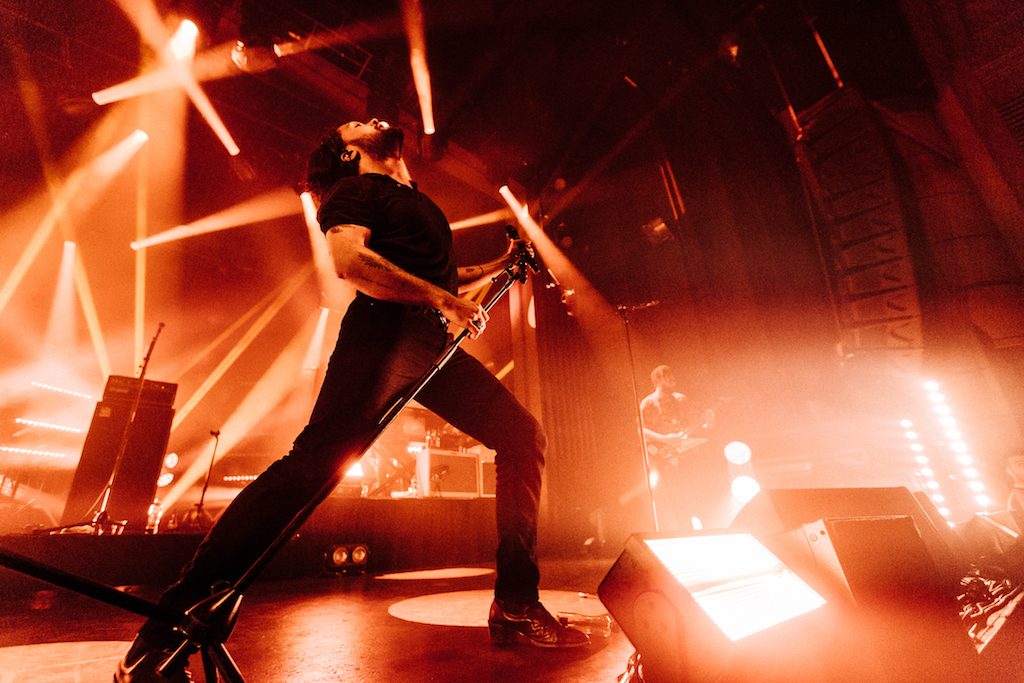
It would probably surprise most fans to know that Le’aupepe doesn’t consider himself a natural performer or frontman. In fact for a long time he thought he’d be a drummer or a bass player, not the guy out in front. Now though, his onstage persona — in particular his sultry dance moves and swaying hips — has seen him declared one of the best frontmen in the game. He’s even become the subject of entire Facebook meme groups.
You can trace the roots of the band’s performance style back to the immense, evangelical masses of Hillsong. Witnessing and experiencing those, Le’aupepe says, was the first time he became aware of the spiritual and symbolic power of music; the musical drama the band strive to create on stage is inextricably linked to these childhood moments.
I mention that there are now entire Facebook groups devoted to the power of his hips, and Le’aupepe laughs loudly, before admitting that actually makes him really happy, as a lot of the dance moves he pulls on stage are informed by traditional Samoan dance. “Only the Polynesians get it when they come to our gigs,” he chuckles.
But Le’aupepe puts the band’s live appeal down to something else. “I think now, more than ever, people just want to see someone who’s a complete fuck up on stage bearing their soul,” he stresses.
“I’m not perfect, I’m a fuck up. I genuinely feel that like we live in an age where vulnerability and humanity is only acceptable if it’s done in a certain way, and maybe people are just looking for something that’s a little bit less intimidating in terms of a connection with the band. Not just me as a front person, us as a band.
“Being kind of confronted with imperfection and real humanity in a way that’s almost being fucking forced down the audience’s throats, is probably part of it.”
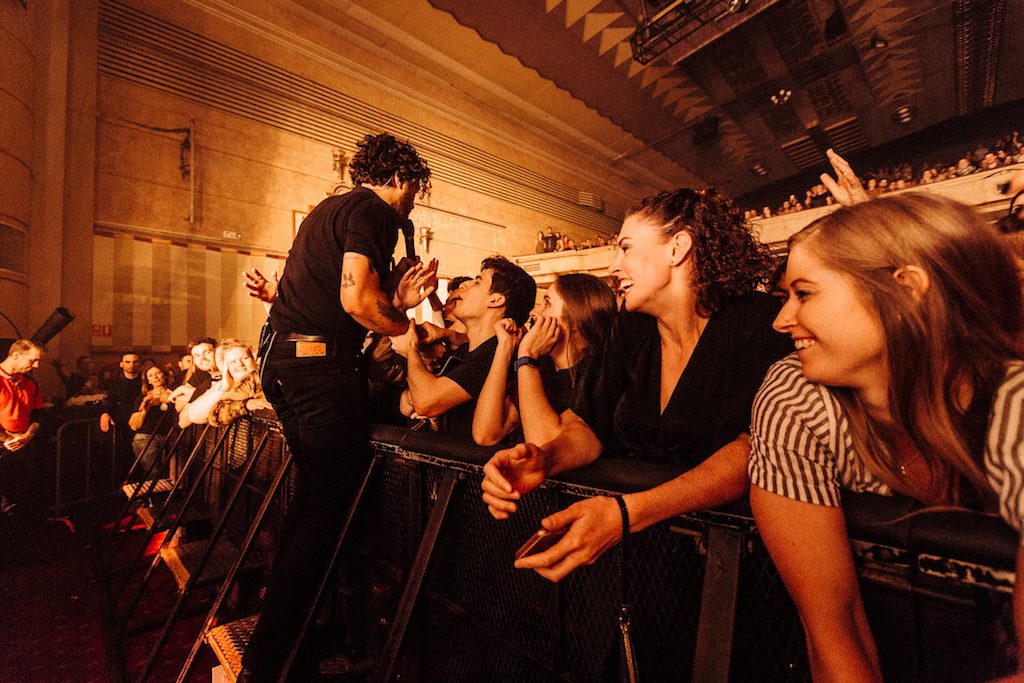
Persevere
Go Farther In Lightness’ songs have become a salve for many, including Le’aupepe himself. In August last year, following the death of his father after a long battle with cancer, Le’aupepe found himself clinging tighter and tighter to the songs on the record; lyrics that had been written years before suddenly became lifelines in the midst of his grief.
Speaking about it now, it’s clear Le’aupepe is still reeling from the loss, and it’s the only time in our long conversation where he seems genuinely unable to articulate his feelings.
“Now more than ever that I’ve had to say shit like say yes to life, and don’t let the spirit wane. Those were fucking cliches but I literally wrote them to keep me alive.”
“Everything changed when my dad died,” he says, after a long moment of silence. “Pretty much the whole album changed for me, because I thought I was moving on from something really big and monumental in my life…and then my dad died and just everything changed. So I don’t know what it means anymore. Maybe I need to listen to it again. I think there was something prophetic about a lot of the songs because I had to rely on them, and stay true to the stuff I was saying.
“Now more than ever that I’ve had to say shit like say yes to life, and don’t let the spirit wane. Those were fucking cliches but I literally wrote them to keep me alive. All their meanings have changed quite drastically and significantly for me, because my universe fucking fell out of the sky.”
A week later at the Enmore, he’ll talk to the audience about his father. “He was the man that made me who I am,” he tells them. “He was the best person I ever knew.”
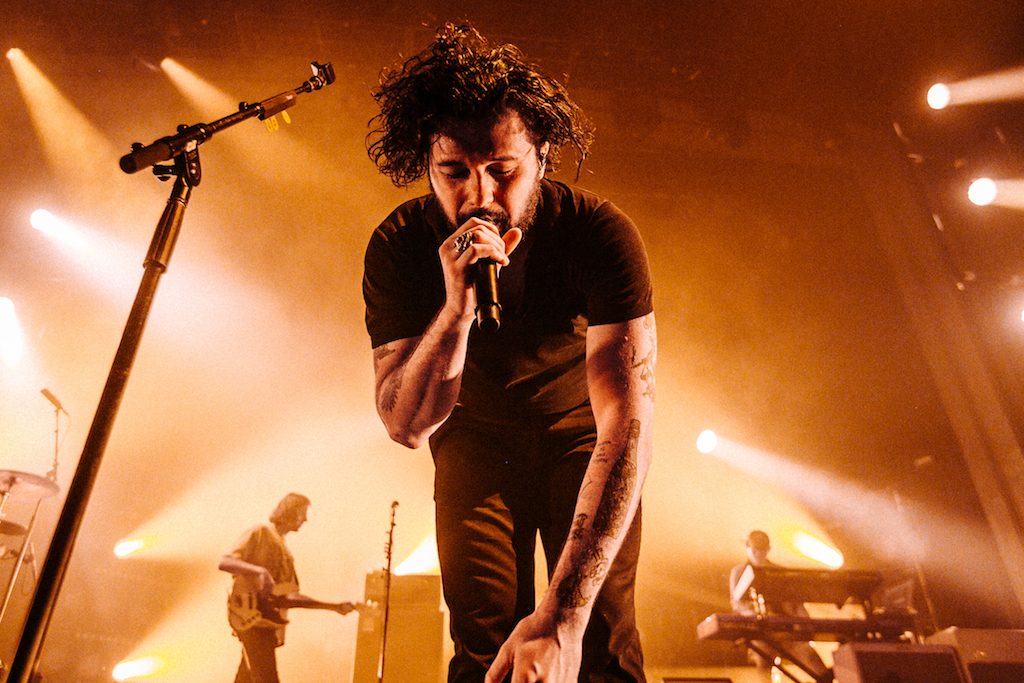
Now more than ever, Le’aupepe needs music. “I believe in the emancipatory potential of rock and roll,” he says after another long pause. “It has an unbelievable freeing power and staying power in the world. That’s why I’m glad it’s gone out of the mainstream and gone underground again, because it has time to gestate and become new and inclusive. I think what me and Joji always wanted to do growing up…we wanted to make music that we wish we had back then.
“And I think there’s something really powerful about this aspirational type of music. I think it’s really important, now more than ever, I think in this day we need music that’s empowering for people, that isn’t about catering to the fancies of culture. It’s about uniting people from all walks of life. And that’s really important, that kind of shit can actually change the world, and change people’s lives.
“You’ve got all colours, all creeds, fucking probably even different sides of the political spectrum, but they’re all in one room and they’re trying to dig deeper in this humanity. I think there’s something really important about aspirational music. I think aspirational music is fucking vital.”
Say Yes To Life
Having wrapped up their touring duties in Australia, Gang of Youths will soon head back to their adopted home of London. They have a couple of dates scheduled around Europe and North America, but on the whole their rigorous album cycle is now drawing to a close.
Le’aupepe definitely wants to do another album, but there’s nothing definite on the horizon just yet. Since his father’s death in August, his focus has been drawn away from music and towards his family; he wants to devote his time to being a good husband, a good friend. He’s in New Zealand now to try and track down pieces of his family history.
“I’m trying to focus as much as I can on just working on everything after my dad died I guess,” he says. “I want to have kids and I want to see the world and I want to do other shit, and I want to save the boys from having to keep doing Gang of Youths for a little bit because they have other things they want to do. Like Joji has a whole mess of other musical projects that I really want him to get started, and I just feel like Gang of Youths stopped him from doing that. And Max just finished his law degree. He just got his law degree and I want him to be able to go and do something else for a few months.”
The career “stuff” is fine, he adds, but at the end of day it’s just a job. A great job, for sure, but just a job. As always with Le’aupepe, there are much bigger things to consider.
Jules LeFevre is the Editor of Music Junkee. Follow her on Twitter. Jess Gleeson is a freelance photographer based in Sydney. Follow her on Instagram.




